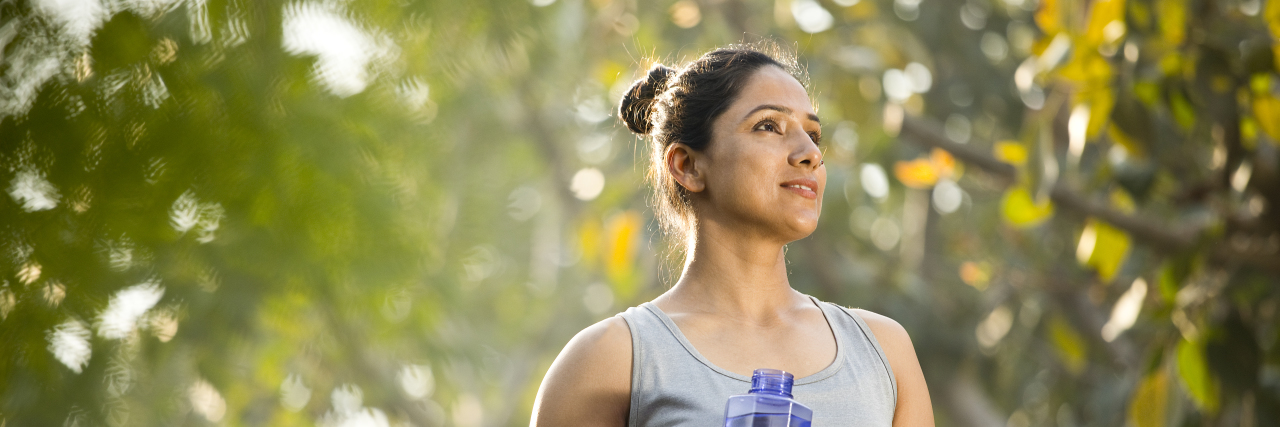Why Fitness Culture Is Often Toxic to People With Disabilities
About five years ago, I was sitting in a doctor’s office listening to her tell me that if things continued the way they were going, I probably would barely be able to walk within a year’s time, an unfortunate side effect of years of seizures due to conversion disorder. I was shocked — that didn’t seem possible. Sure, I had been experiencing a lot of pain in my legs whenever I was on my feet for too long or walked too much, but not being able to walk at all? No way.
I immediately started treatment four times a week, was spending thousands of dollars a month on getting my mobility back, and five years later, I’m in much better shape! I still can’t walk super long distances, and I have to walk slower than the average person but I’ve made a lot of progress. With that progress, there’s still a lot I can’t do — I likely will never be able to run again without a ton of pain, and my stamina is really low because everything takes so much effort. But I want to do more. I want to take baby steps to get there and I know it will require a lot of support to get my fitness back.
Here’s the thing, though. The fitness world is really inaccessible for someone like me who deals with physical health issues, is prone to injury, and experiences ongoing pain. On top of that, most fitness spaces are extremely fatphobic, or focused on weight loss. As someone who struggles with my body image, those spaces can be really triggering. I remember having a personal trainer, whom I wanted to help teach me the correct form to avoid injury, but he was so focused on my weight. I felt like trash every time I had a session. Many gyms boast about how they push people past their limits and help you crush your weight loss goals. What if I don’t have those goals? What if those goals are actually really unhealthy for someone like me? What if I want to safely play within my limits, and learn to build a relationship with fitness outside of weight loss? That toxic messaging completely turns me off from trying working out.
I just want to try new activities and get in touch with my body again. Because of my health issues, I’ve felt at war with my body, and years ago I would push myself while exercising to the point that it was more of a punishment, and more harmful than helpful.
Most workout classes are inherently ableist, and often support certain body types or fitness levels. The idea of an hour-long workout class is impossible for someone like me. Within 5 minutes of a relaxed “workout,” I am already in pain. And that’s hard for me to admit, because it makes me feel really bad and ashamed about the things I struggle with. I wish there were more opportunities for me to just get to know my body, and explore movement without any pressure to hit X calories or Y heart rate to get into fat burning.
We need to think about how spaces that should be all about promoting positive physical and mental health often cause harm. They can contribute to eating disorders, obsessive working out, or not listening to your body and pushing through when your body tells you to stop. We need more spaces catered towards enjoyable movement where fun and safety are the top priority.
I try working out at home by myself, but it often gets boring and because of my limitations, I always feel horrible afterward. It’s frustrating because every doctor I go to and every therapist I see tells me I should be working out more for two reasons: 1) It’ll help me lose weight, which will resolve all my pain (it won’t), and 2) It’ll help my mental health. Except I feel terrible every time I work out. I get tired out easily, the pain starts, and I feel angry that I can’t do more. People talk of endorphin rushes they get when they work out; I cry after most workouts. I hate how limited I feel, because I know most other people my age would barely feel a thing if they did the workouts I did. I know I shouldn’t be comparing myself to them, and I am proud of how far I’ve come, but I’m disappointed that there aren’t more safe opportunities for me to explore physical activity.
Working out and exercising isn’t accessible for everyone, and while it is important to do physical activity for our health, we have to recognize all the hurdles and hoops people like me have to jump through. We have to be cognizant of the fact that even though it can feel really good, it can also feel really bad. I hope that I can learn to be kinder to my body, and find ways to pursue physical health in a safe way that doesn’t harm my mental health. I hope that I can get to a point where movement of any kind feels enjoyable, safe, and good enough again. It will be an ongoing battle, but I look at where I was before and where I am now, and know that there’s so much potential to keep improving — even if it takes a long time, and even if it’s slower than I want. It doesn’t have to be a race or a competition, my own pace is just fine.
Getty photo by stockimagesbank.

